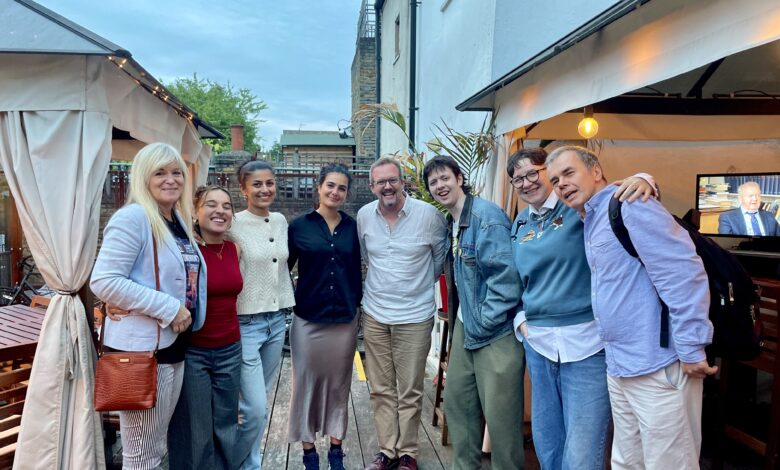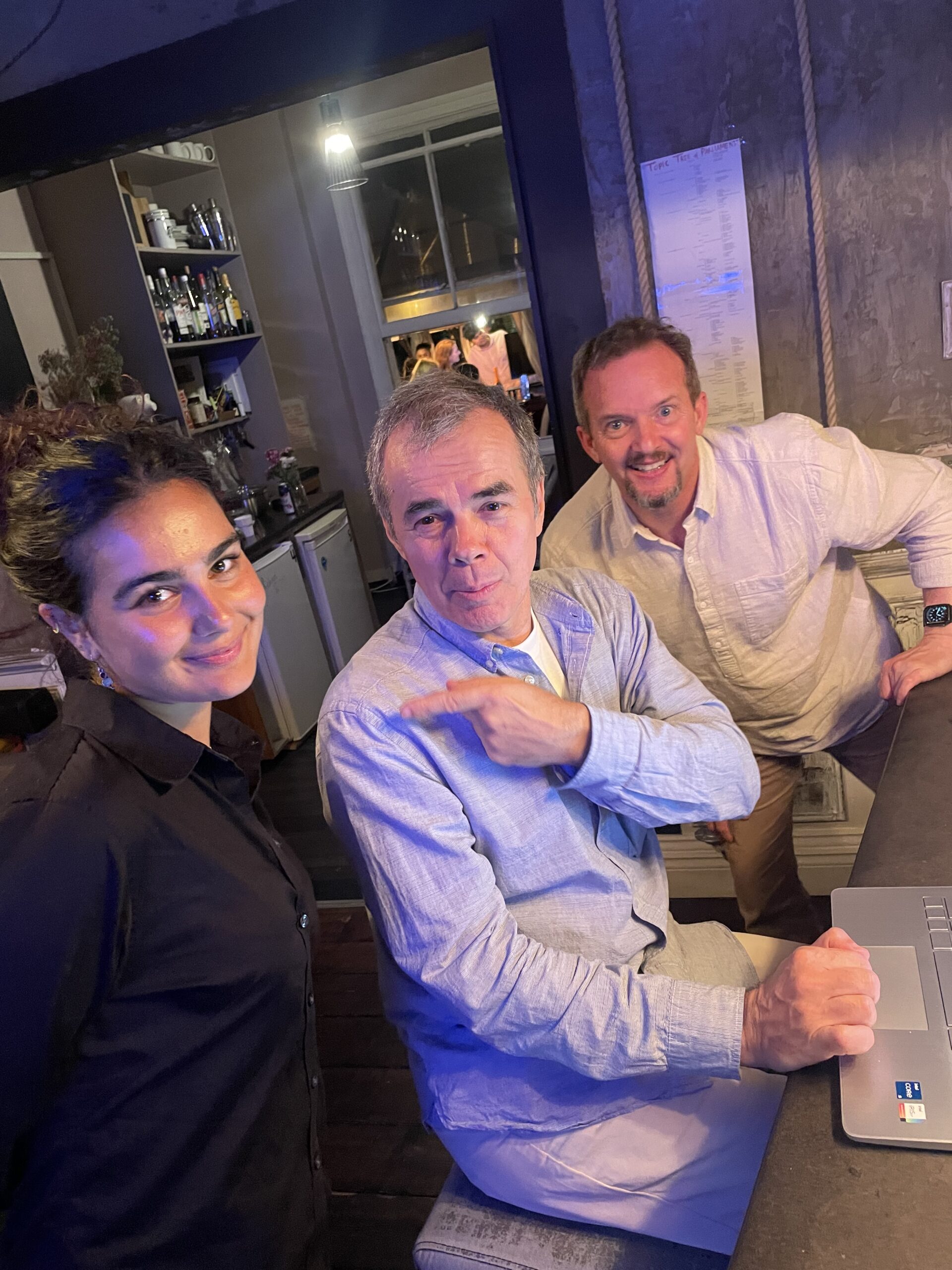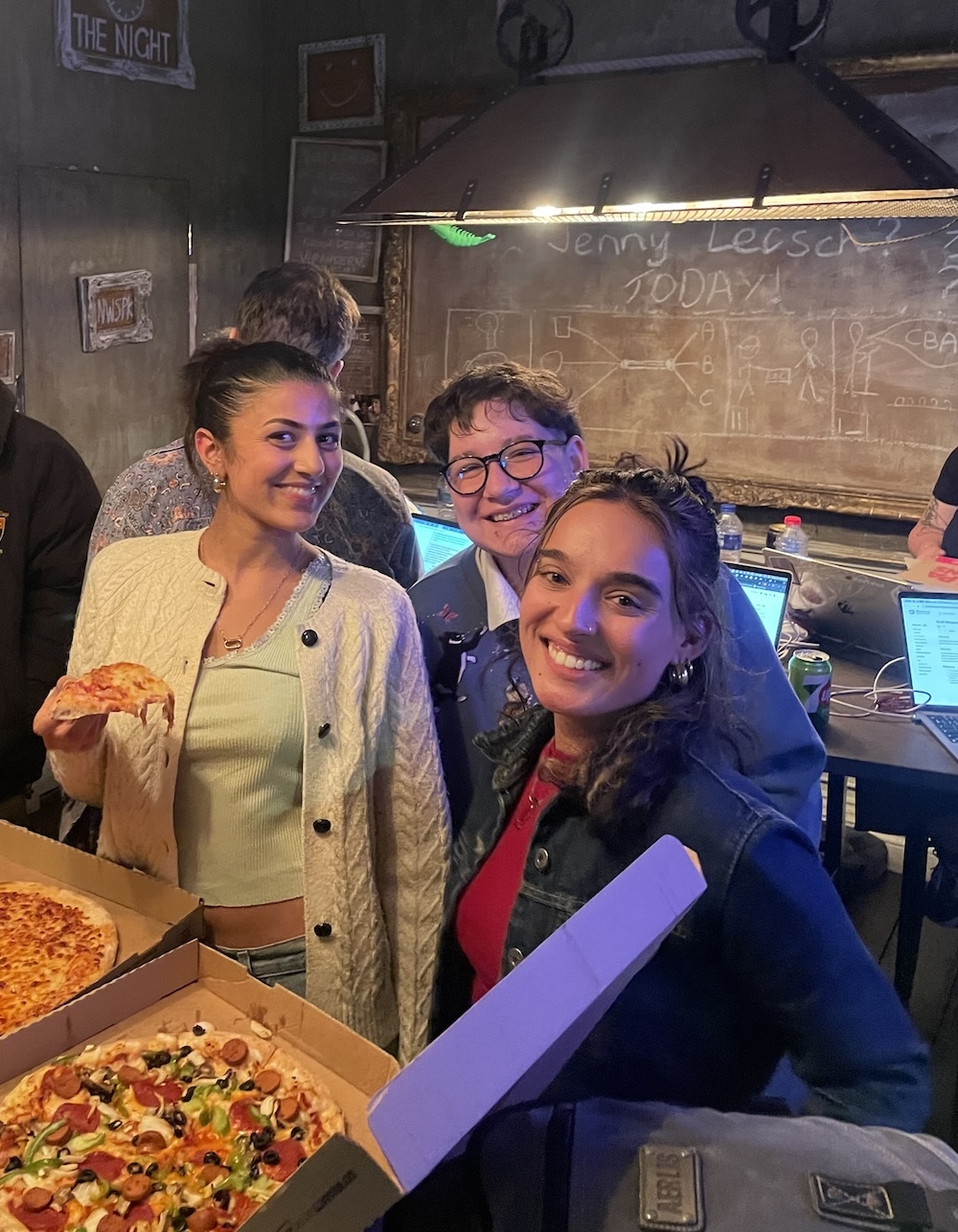
An Electrifying All-Night General Election 2024 Wikipedia Editathon: Documenting Herstories in Real-Time
It was a night to remember at Newspeak House. The atmosphere on the packed roof terrace buzzed with excitement, the air thick with the energy of anticipation and celebration. Amidst the clinks of glasses and jubilant cheers of Labour election campaigners toasting their hard-won victories, another equally momentous event was unfolding: an all-night editathon to create Wikipedia pages for the newly elected women Members of Parliament.
As the results poured in and the political landscape reshaped itself before our very eyes, a dedicated team of Wikimedia editors, many of them women (yay!), hunkered down to ensure history was not just made but meticulously documented. Led by the senior editor Edward Hand, supported by Eva and Karolina from Cybersalon.org, the group was on their 4th GE editathon. The edit veterans were joined by Middlesex, Bristol and Manchester University students, aided by Newspeak Fellows and tech leads from London fashion brands.
The Party Atmosphere at Newspeak House
Newspeak House, often considered the unofficial headquarters for civic technology and digital democracy enthusiasts in London, was a fitting venue for such an event. On that warm election night, it was transformed into a hive of activity. The terrace, lit by flickering garden lights, hosted Labour campaigners, who were in high spirits as news of their party’s successes spread. Inside, in the study room under the dim but cosy light, the editathon team was hunched around their laptops, focused on a different kind of victory: ensuring that the achievements of new women in UK politics were given accurate coverage on Wiki pages.
The editathon was an electric mix of celebration (our favourite Asahi beers in hand) and serious work. Laptops whirred, keyboards clattered, and across the room, screens glowed with the emerging biographies of female parliamentarians who had shattered glass ceilings and redefined representation in British politics. For the first time in the history of House of Parliament, women won no less than 40% of the seats, 242 seats in total, which was a great progress on the last Parliament where only 220 MPs were female.
Worth mentioning that UK managed to beat negative trend in Europe, as women numbers stepped down in recent elections of MEPs for European Parliament, falling for the first time, to only 38.75% share of the total seats.
The Dynamic Trio: Finchley and Golders Green, Dagenham and Maida Vale
Among the pages being crafted were those for the new MPs of Finchley and Golders Green, and Dagenham and Reinham and Maida Vale. Each entry was a labour of love, meticulously detailing the backgrounds, achievements, and electoral triumphs of these remarkable women. Three new entries caught our eye and are worth mention.
Finchley and Golders Green: A constituency known for its vibrant diversity, it now boasts a new representative who is set to bring fresh perspectives and dynamic leadership to the table. Her journey from human rights law, community activism to the halls of Parliament is a story of resilience and dedication. Keir Stammer was closely involved in candidate selection for this sensitive seat, and the party selected a moderate, Sarah Sackman, who has just been nominated to the role of Solicitor General for England and Wales. This post is appointed by King, but on the advice of the Prime Minister. It carries a large premium on average MP salary.
Dagenham and Rainham: This historically significant area, with its rich industrial heritage, now has a new MP, Margaret Mullane, who has campaigned tirelessly for workers’ rights. She worked for many years for the previous MP Jon Cruddas, and her story is one of steady commitment to her constituents and a vision for a fairer, more equitable society. Mullane is a fierce campaigner, who shown her mettle in fighting against unfair imposition of Community Levy on local homeowners who were victims of flood.
Queen’s Park and Maida Vale: A new constituency, created in 2023 https://en.wikipedia.org/wiki/Constituencies_of_the_Parliament_of_the_United_Kingdom , provided a strong support to Georgia Rebuck Gould, previously the leader of Camden Council. Georgia is a known promoter of Citizens’ Assembly https://participedia.net/case/6975 and is expected to bring more direct involvement of local people to the topics debated in House of Commons. She is also a new Mum, having given birth as recently as September 2023. As the House working hours are still somewhat unsociable, it is a challenge for the female MPs to juggle political work and family.
This new women cohort is building on a reach tradition of women making their voices heard in the Parliament, but we need to remember the fight is very much still on. As Hansard notices https://equalities.blog.gov.uk/2020/06/30/women-mps-from-1918-to-1997/ , even as recently as 1997, only 10 women ever served as Cabinet Ministers.
The Women Editors Making Waves
One of the most striking aspects of the editathon at Newspeak House was the number of women editors participating in this momentous event. Wikipedia has long faced criticism for its gender imbalance, both in terms of content profile and contributors. But that night, the script was flipped at last. Women from diverse backgrounds and professions came together for the election night, united by a common goal: to ensure that the stories of women in politics were told accurately and compellingly. The team aims to be fair and follow Wikipedia rules but keep irrelevances (like colour of suit worn on the day of opening of the Parliament) away from the pages.
In the study room there was a palpable sense of camaraderie and purpose. Wiki Editors exchanged tips on citation, debated the finer points of biographical detail, did a bit of usual stalking (for professional reasons of course) and cheered each other on as new pages went live upon announcements of election results. The spirit of collaboration was in the air, and it was clear that this was more than just an editing session; it was a celebration of women empowering women and expanding Wikipedia’s inclusivity on that occasion.
A Night of Firsts
For many of the participants, students from various universities, this was their first editathon. The thrill of seeing their contributions, their new pages published in real-time, knowing that they were playing a part in documenting history, was very enjoyable. For the seasoned editors, it was a chance to mentor newbies and share their passion for open knowledge as well as instil the values of Wikipedia into the new team.
As dawn broke and the last of the pages were finalized, there was a collective sense of accomplishment. The editathon had not only succeeded in its mission to ensure fair and respectable coverage of many new MPs but had also fostered a vibrant new community of female (and male) new editors who were committed to continuing this fun but also essential work. When you use Chat GPT or other AI bot next time, remember that it first needs to scrape Wikipedia pages for facts, before spitting it out as a response to your queries.
Celebrating Victories, Big and Small
Our pizza-and-sushi fuelled editathon at Newspeak House was a microcosm of the broader changes happening in British society. As the Labour, Lib Dems and Independent campaigners on the roof terrace celebrated their political victories, the editors indoors were celebrating victories of their own. Each new Wikipedia page represented a step towards a more inclusive and representative digital record – even it took a few ‘edit wars’ to win! We are entering new age of multi-party politics, and a fair and unbiased coverage of the activities of MPs will be vital to political debates.
In the end, it was a night of celebration and commitment to a shared goal of collaborative politics that both Cybersalon.org and Newspeak House practice. We have not had much sleep, but the all-night editathon was more than just an event; it was a testament to the power of collective action of Wiki squad of editors and the importance of documenting the stories of those who are often overlooked over are covered unfairly. Here’s to the new women MPs of Finchley and Golders Green, Dagenham, Maida Vale and many others – and to the dedicated editors who keep the open knowledge practice alive and kicking.
We are grateful to Wikimedia UK (CEO Lucy Crompton-Reid), Ed Saperia (Dean of Newspeak House) and Dr Richard Barbrook for their support for the GE 2024 Wikipedia Editathon.










